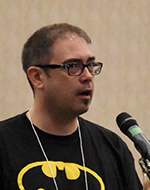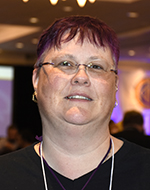Page Content
The Annual Representative Assembly convenes every May long weekend in Calgary or Edmonton.
Annual assembly fascinating even during the dull moments
Welcome to In Focus, an ongoing series that shines a spotlight on the operation and programs of the Alberta Teachers’ Association. This third instalment focuses on the ATA’s Annual Representative Assembly.
Democracy.
It’s the word you hear most often when listening to experienced ATA members and staff talk about ARA, the Annual Representative Assembly that acts as the AGM for the Alberta Teachers’ Association.
Occurring every May long weekend, the event sees more than 400 teacher delegates converge on a single conference room in either Calgary or Edmonton, where they spend hours countering the effects of cramped seating arrangements and sometimes spotty air conditioning with free-flowing coffee, snacks and memes shared via social media. The event is also known for the flamboyant attire favoured by some attendees, sometimes mind-numbing budget deliberations and impassioned monologues during policy debates.
For teachers who have never attended ARA, it can be difficult to grasp what it’s all about.

Brett Watt
President, Evergreen
Local No. 11 |
“It is this mystery animal,” says Brett Watt, president of Evergreen Local No. 11 and a veteran of nine or 10 ARAs.
“Amongst my colleagues, they know that I go to this convention on the May long weekend and … do stuff. It’s something that you really have to experience.”
Parliament of the ATA
ARA’s role in the overall workings of the Association is outlined in the Teaching Profession Act. While Provincial Executive Council (PEC) fulfills the Association’s executive function, ARA serves as its parliament.
Each year the assembly approves the Association’s annual budget, decides on revisions to its bylaws, determines the programs to be offered in the following year and establishes the Association’s policy on educational issues.
“We are a democratic organization — we’re very proud of that — and the forum for our policy decisions is our Annual Representative Assembly,” said Executive Secretary Gordon Thomas.
The assembly is composed of 425 delegates representing all 55 locals, which are each entitled to a certain number of seats based on population (each local is guaranteed at least two representatives). Each local decides on its own how to allocate its spots. Locals wishing to have resolutions considered at ARA must have them approved by a majority of their members and submit them to the Association by Dec. 15.
PEC members also attend ARA and can participate in the open discussions. Executive staff attend in case their expertise is required to answer questions from the floor.
The weekend also includes speeches by the ATA president, executive secretary and several visiting dignitaries. Often, the minister of education or another government representative makes an appearance or delivers a speech.
The Association hands out honorary memberships and other awards and a pension plan update is delivered by a live person with a long list of credentials. This fact doesn’t deter some delegates from grilling the pension expert about specific aspects of the plan’s investments or coaching the expert on the merits of ethical investing.
One way that ARA differs from the AGMs held by most other teacher organizations is that its agenda does not include the election of board members, because the ATA prefers to hold its council elections through a completely separate process that’s open to all members. This means ARA is free of overt displays of politicking.
“We don’t do that; we do policy,” Thomas said.
Let’s talk policy
Debates on policy motions are at the heart of ARA. These resolutions can originate from PEC or individual locals and establish the Association’s position on a wide range of issues.
Discussions at recent ARAs have dealt with issues such as Catholic education, international testing, child poverty and women in leadership roles.
ARA proceedings adhere strictly to Robert’s Rules and unfold according to a carefully planned agenda, with the president, vice-presidents and past president taking turns as chair. The process can be confusing and intimidating for first-time delegates, as can stepping up to one of the microphones to express an opinion. Even veteran delegates can find this scary.
“It is still terrifying to stand up in front of 400 people and say this is right or this is wrong but I feel that my voice is heard by my peers by being at ARA,” said Deanna Simmons, an outspoken delegate from Edmonton Public Local No. 37 who has attended three ARAs.
Although speaking at ARA can be intimidating, Simmons says the assembly provides a positive atmosphere.
 |
Deanna Simmons
Edmonton Public Local No. 37 delegate |
“I’ve always felt a very supportive environment around me, whether or not my opinion agrees with the majority.”
Even so, ARA is not completely free of friction, sometimes providing a special blend of conflict and collegiality. Some debates are emotionally charged, and attendees do their best to sway their colleagues with the best arguments they can muster.
“I’ve had some great verbal battles with very good friends of mine in the Association and once it’s done, it’s done,” said ATA president Greg Jeffery, an ARA attendee since 1990.
“We’re debating in the best interest of Alberta teachers and the assembly will eventually get it right. Maybe I’m on the winning side; maybe I’m on the losing side.”
Sometimes during an extended debate the room is ready to move on but some delegates choose to continue speaking their minds, generating grumbles that fill the air and attendees’ Twitter feeds. In these moments, it’s usually just a matter of time before a delegate uses his or her turn at the mike to “call the question.”
This brings about a vote and, if two-thirds of the assembly agree, further debate is suspended and the motion being debated is immediately brought to a vote. These decisions inevitably bring a counter-backlash both in the room and on Twitter from those who feel that democracy is being stifled.
Many ARA delegates are regulars, and some have a reputation for being powerful orators, such that the room perks up when they take their turn at the mike, Jeffery said.
ARA also provides its share of light moments. Retiring members of PEC, local presidents and long-time delegates are often regaled with parting words and gifts, some gag oriented.
However, despite the regular moments of levity, the overriding mindset is that everyone is there to take care of business.
“It’s not a big tea party,” Thomas says. “The profession has some gravitas and you see it in action at ARA.”
Good memories
ARA also delivers some moments that linger in the memory for years. One such moment for Thomas came in 2001, when the assembly adjourned so delegates could board a fleet of buses, head across downtown Edmonton to the Alberta legislature and hold a debate on the front steps. It was a time of budgetary constraints, and the assembly passed a resolution calling on the government to establish classroom conditions that would allow teachers to meet students’ learning needs and to negotiate fair salary increases for teachers.
For delegates, ARA is important because it
enables them to have a voice in the Association’s operation and policies. |
Another memorable moment for Thomas came in 2014, when then education minister Jeff Johnson made a brief appearance just two weeks after his Task Force for Teaching Excellence produced a report that teachers viewed as a blatant attack on the teaching profession. The mood in the room at ARA was very frosty, and Johnson received no applause. After he’d left, delegates passed a resolution declaring that Alberta teachers had no confidence in the minister.
“That was the headline and the lead story on the news all weekend and of course it didn’t improve an already very poor working relationship,” Thomas said. “But it also honestly reflected the views of teachers and teachers wanted that known.”
For Jeffery, a standout moment is the budget debate during his first ARA in 1990. Back then the event took place during the spring break of the public system in its host city, either Edmonton or Calgary, and ran from Wednesday until Saturday.
And in those days the budget was always heavily contested, prompting delegates to wager how late it would go.
Jeffery was a bit off when he selected 8:30 p.m. as the debate didn’t end until after 1:30 a.m.
“It was crazy but fascinating,” he said.
In 1994, ARA was moved to the May long weekend, running Saturday all day and Sunday from morning to 10:30 p.m. Any business that remains is taken care of on Monday morning.
For delegates, ARA is important because it enables them to have a voice in the Association’s operation and policies.
“It’s a democracy that you don’t tend to see that often,” Watt says. “More often our democracy is all about ... voting for somebody who’s going to be our voice whereas this is actually voting about what we’re going to do.”
By the end of ARA, more often than not, exhausted participants leave feeling relieved and with a sense of unity and accomplishment.
“It’s an exhausting three days but the sense of fulfilment I get is quite astounding,” Watt says.
For Jeffery, as a table officer who sits on full display at the front of the room all weekend and who is available during down times to field questions from delegates, it’s also a tiring but gratifying weekend.
“It’s a good kind of tired when it’s done.”
